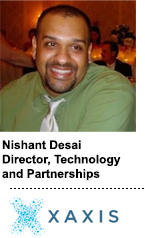 Xaxis technology and partnerships director Nishant Desai will speak at AdExchanger’s upcoming Programmatic IO San Francisco conference on April 29-30, 2019.
Xaxis technology and partnerships director Nishant Desai will speak at AdExchanger’s upcoming Programmatic IO San Francisco conference on April 29-30, 2019.
Agencies aren’t first-party data owners, cookie trackers or data processors, but they must still keep a handle on online identity while the tech ecosystem shifts underfoot.
“The notion of how advertisers identify audiences and what identity even means is rapidly changing,” said Nishant Desai, Xaxis’ director of technology and partnerships.
And the agency role is changing as well.
Desai spoke with AdExchanger about how the GroupM programmatic buying business navigates the ad tech ecosystem as first-party data, identity and privacy become top-of-mind issues for brands.
AdExchanger: What’s your data and identity road map?
NISHANT DESAI: We don’t have a firm road map in the typical sense, because so many things are still changing and details aren’t filled out. And our technology partners are in similar positions. Take reports about what Chrome (the Google-owned browser) could be doing to block third-party cookies and tracking.
If Google announced tomorrow that starting in a month it won’t allow third-party cookies, then we would be scrambling for solutions, and it would be a huge headache for agencies and tech companies. But that’s not the case. I would expect a six-month or yearlong lead-in before a change like that. And in this case Google would have antitrust concerns around how it would be implemented. It could be disastrous, but it’s an unlikely scenario.
Do you think we are close to a situation where the online ad industry won’t be based on cookies?
I don’t know if we’ll ever go to a truly cookieless ecosystem. I think what you’re likely to see is a shift from third-party to first-party cookies. What Google does now through Tag Manager and Google Analytics is create a first-party cookie for a user that goes through emails or offline data to connect with third-party data on the back end.
I think you’ll see more solutions move into that space, where you have a first-party cookie domain but then use historical and third-party data as a bridge to a stronger identity. I think you’ll also see more agency-owned data sets that sit in a first-party cookie domain space.
How does the strength of cookies on a browser impact the inventory rates and how you buy media there?
Because ITP (Apple’s ban on third-party tracking and targeting in its Safari browser) has gotten a lot of attention, this has been a big focus. What we’ve seen generally is gaps in attribution and retargeting, but not so much reduction in scale or spending.
If an advertiser is heavily skewed toward Safari users, there could be cases where you find you can’t scale an audience strategy. In that kind of instance, we might do more private marketplace deals with publishers we index highly with those audience segments. If we have good first-party data, we could target through a deal ID or using context as a proxy.
It’s not an issue yet, but I imagine that as Safari and other browsers potentially take a more proactive approach, it’s something that will be more top of mind.
How involved are agencies in the nitty-gritty of identity technology development?
There’s some agency involvement. There are GroupM and Xaxis folks in those kinds of IAB working groups for GDPR, privacy and identity. But the people driving how this happens are and have to be the ad tech vendors.
We do have more conversations now with clients about the ad servers they’re using. From the brand perspective that’s where the identity management conversation happens.
From the agency standpoint, the unifying tech is the third-party vendor ecosystem. If an agency is building audience profiles, say, then it’s probably inside DV 360 (Google’s DSP and buy-side ad server) or other DSPs and ad servers.
This post was syndicated from Ad Exchanger.


More Stories
Campari unveils new bottle design at Auckland event
Measurement Is Key to Make Streaming TV Ad Revenue Grow Even Faster
Yahoo Extends Its Identity Solutions To Connected TV